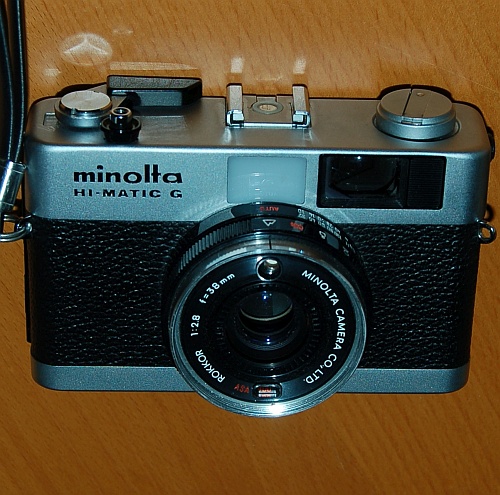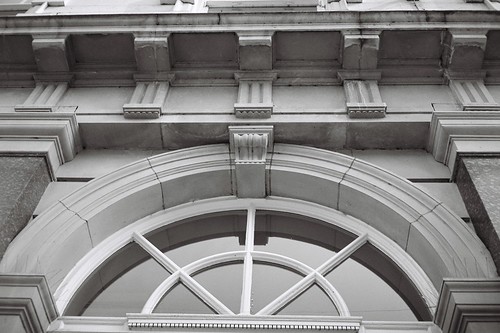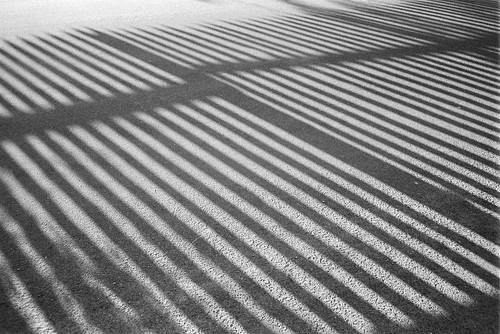Minolta’s Hi-matic series of compact cameras span more than 20 years of production and were usually rangefinders such as the well-regarded Hi-matic 7sII. However the series also gave rise to a few Point & Shoot (P&S) most notably the Hi-matic G launched in 1974.

Unlike some rival P&S like the Chinon 35 or Konica C35V that have clearly evolved from rangefinders, the Hi-Matic G was a completely new model with a different exposure system to its immediate rangefinder predecessor the Hi-Matic F. Some pundits have even queried if someone else had made it for minolta as it was so like many other P&S in the 70’s in classic chrome black styling. My one’s lens barrel had slight movement but this may have been a one of and it didn’t affect shots.

Minolta Hi-matic G Specs
- Lens: Rokkor 38mm 1:2.8
- Focus: Zone & Scale
- Metering: CdS
- Aperture: f/2.8-f/14
- ASA range : 25-400
- Shutter: 1/30-1/650
- EV 100asa: 8-17
- Filter-Thread: 46mm
- Battery : PX675
What ever’s the truth of its origins you do get a 4 element Minolta Rokkor lens which is sharp. This can be focused by using 4 zones on the top of the lens barrel like an Olympus Trip 35. However the camera is actually a smooth scale focus with distances printed beneath the barrel for more accurate shooting in low light. I quite like the option to switch but find in most cases with scale focus viewfinder your brain still tends to use the 0.8, 1.5, 3m and infinity model.

The rest is fairly typical for a 70’s Japanese compact rangefinder or P&S with the exception of a fairly wide f/14 smallest aperture. The lens barrel mounted CdS metering system automatically sets the camera exposure by a series of aperture shutter speed combos. These are displayed on a needle meter scale on the right hand side of the viewfinder. The shutter, aperture speeds are all industry standard and offer no surprises. There are no manual control other than turning from auto to a series of Guide Number(GN) settings for flash. There is no exposure lock if the meter thinks you are at risk over or under-exposing and there is no bulb setting (shame as it’s cable threaded).

The metering works well enough and was pretty typical for cameras for the era, Also typical it uses the now defunct 1.45v mercury px675 cell but a 1.4v zinc air 675za hearing aid battery (5 for a quid in Poundland) will suffice abet with more limited power time. The camera lacks a self timer. The viewfinder has usual frame and parallax markings but you’ll struggle to see you focus settings from it.

The main problem with the Hi-matic G is that it a pretty vanilla camera for the 70’s. It takes reasonable shots and it’s specs match its rival but that it. There are no standout features and no endearing/maddening quirks and there is the smallest f/14 aperture size. Does it offer more than the Olympus Trip 35 – no. In fact the Trip although on paper is more limited with just 2 shutter speeds works out better due to its marginally better optics and sensible weighting of its aperture to encourage good depth of field. Now many of my other P&S are equally clobbered by the Trip but they offer quirks or features that the minolta doesn’t. That said it really does nothing wrong per se.
They are widely available and with a bit of luck you can get for a tenner on eBay. Mines end up being sold there. Lightseals will need done but this is relatively easy to do and as ever watch out for battery corrosion. A lens cap is an indicator looked after. It was succeeded by the G2 which is an altogether more plasticky affair.
Alternatives
- Olympus Trip 35 – The big daddy of P&S
- Chinon 35 – A much more capable rangefinder based 70’s P&S
- Konica C35V – Zone focus version of the classic C35 rangefinder
- FED 50 – Wonderfully Bonkers Soviet P&S with rangefinder links
Helpful links
- Minolta Hi-Matic G page at Camera-wiki
- Manual at Mike Butkus’s site
- Compact 35 Group at Flickr

One thought on “Minolta Hi-matic G Review : Polished but Vanilla P&S”